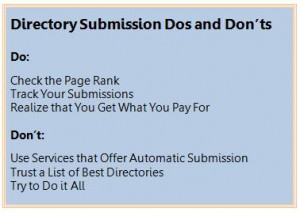Updated: May 26, 2013
As with just about every SEO and online marketing method ever developed, the practice of directory submission has seen its share of controversy. Unsurprisingly, this controversy started with the black hats.
The practice of directory submission developed organically the way things do when the internet hive mind is involved. People started making lists of their favorite websites on personal pages, then companies started building these sorts of pages as a service to visitors. Then, the less scrupulous among the SEO and online marketing world joined the fray, buying and selling directory links with no vetting process to speak of. Eventually it became difficult to discern a quality directory from an ad repository with no intrinsic value.
These sites have been hit hard by Google’s algorithm updates, as have the companies that use them, but that doesn’t mean that directory submission isn’t still a viable strategy. You may be looking to hire a directory submission service, or you might wish to handle your own submissions. Either way, there are a few things you should know.
Don’t: Use Services that Offer Automatic Submission

If your site starts showing up in directories that are inappropriate, or on pages that are otherwise filled with above-the-fold advertising, it says nothing but bad things about your business. Online, as in the real world, you have to be mindful of the company you keep.
Do: Check the Page Rank
When your goal is to increase your authority and visibility on Google, one of your first steps should be to determine what Google likes and what they don’t. A directory with a poor page rank, or with none at all, won’t bring you up in the SERPs, and could drag you down on other ways.
Don’t: Trust a List of Best Directories
Even when these lists are made with the best of intentions, the internet is far from a static medium. Sites that slid past Google just a few months ago could get hit any day. Your safest bet is to do your own legwork to find individual directories, or to hire a trusted source to make your submissions manually.
Do: Track Your Submissions
You can streamline your process and avoid duplication by tracking directory submission as part of your link-building efforts.
Don’t: Try to Do it All
Make sure the directories you submit to are niche-appropriate. Ten quality links are going to do a lot more for you than 100 bad ones. Be selective. Otherwise you risk wasting effort, not to mention what happens if Google catches you running with a bad crowd.
Do: Realize that You Get What You Pay For
If your plan to save money on directory submission is to hire the cheapest company out there, you’re better off not doing it at all. When you hire Dirt Cheap Submission, Inc. (not a real company), you aren’t hiring experts to find the appropriate directories. You’re hiring a computer program to input your company information and blast it out to every corner of the internet, including the seedy underbelly.
Directory Submission is Part of the Bigger Picture
Where once directory submission was a quick-and-dirty practice for bringing in both good and questionable links, it is now part of a targeted online marketing strategy. Not only do you have to submit to the right directories, you have to make sure that what visitors – and Google – find there is a quality website that answers a need.
Keep that in mind, and you can successfully integrate directory listings into your overall online marketing and SEO efforts.
